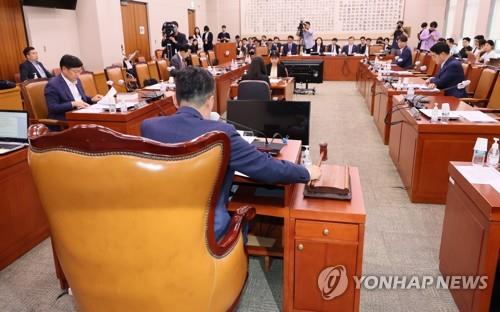- California Assembly OKs highest minimum wage in nation
- S. Korea unveils first graphic cigarette warnings
- US joins with South Korea, Japan in bid to deter North Korea
- LPGA golfer Chun In-gee finally back in action
- S. Korea won’t be top seed in final World Cup qualification round
- US men’s soccer misses 2nd straight Olympics
- US back on track in qualifying with 4-0 win over Guatemala
- High-intensity workout injuries spawn cottage industry
- CDC expands range of Zika mosquitoes into parts of Northeast
- Who knew? ‘The Walking Dead’ is helping families connect
Parliamentary subcommittee passes bill mandating registration of newborns
The parliamentary judiciary subcommittee on Wednesday passed a bill mandating medical institutions to register the birth of newborns, after two unregistered babies were found dead in a refrigerator last week.
The revision to the Act on Registration of Family Relations comprises several legal proposals that have been pending in the committee, with its primary objective being to require hospitals to directly notify local governments of baby information upon their births.
In South Korea, only parents are required to report the birth of their children to the government within a month after birth, but violators are punished only with small fines. That leaves open the possibility of abuse of unregistered babies, critics say.
The parliamentary deliberation on the legislation comes after two unregistered babies were found dead inside a refrigerator last week in Suwon, 30 kilometers south of Seoul. The mother of the infants has been arrested for investigation.
Under the revision, heads of medical institutions must notify the Health Insurance Review and Assessment Service (HIRAS) of the birth information of newborns.
Heads of local governments must also notify mothers to document birth information when registration is not made within a month and will seek a court order for the registration otherwise.
The revision bill is set to be put to a vote at a parliamentary plenary session scheduled for Friday.
“We anticipate a smooth deliberation process as the rival parties have already reached a consensus regarding the bill’s purpose,” an anonymous committee official said.
The Board of Audit and Inspection found that some 2,000 babies born since 2015 in the country were undocumented after birth, and a sample investigation of 23 of them showed at least three died and another was abandoned.
Among these cases, another baby born in 2022 was also found to have died from malnutrition in the southern city of Changwon. In addition, the whereabouts of another baby born in 2021 are unknown in the central city of Hwaseong, and the mother told police she handed the baby over to someone she did not know.
Without a birth registration, a child would be unable to receive routine vaccines and other health care services, and would even face difficulties attending school.
The push to have medical institutions report the birth of babies has been met by opposition from hospitals due mainly to concern about the administrative burden from it and fears of shouldering responsibility in case something goes wrong in the reporting process.
As for criticism over excessive burden on hospitals, Rep. Jeong Jeom-sig of the ruling People Power Party (PPP) said doctors only need to fill out birth information.
“Heads of medical institutions are one click away from sending that information to the HIRAS,” Jeong told reporters after the meeting. “There have been discussions with the Ministry of Health and Welfare and the Korean Medical Association.”
The revision will take effect one year after the proclamation to construct a relevant system, Jeong said.
Meanwhile, another bill, supported by the ruling party and the government, is expected to be discussed by the judiciary committee later as the opposition party has demanded further deliberation.
The bill, proposed by Rep. Kim Mi-ae of the PPP, allows local governments to report a child’s birth when a mother wishes to remain anonymous and hide her identity.
The bill has sparked controversy, with some arguing that it could prevent cases of abandoned newborns, while others express concerns that it may lead to an increase in parents easily giving up their babies.
Earlier on Wednesday, the government and the PPP held a policy consultation meeting and reaffirmed their commitment to passing the bills together.












